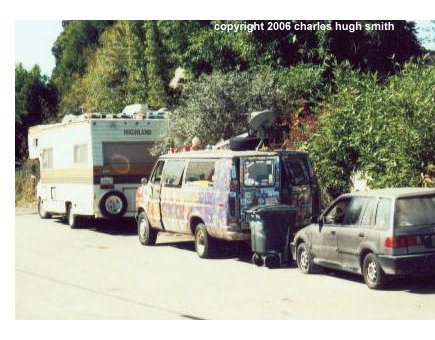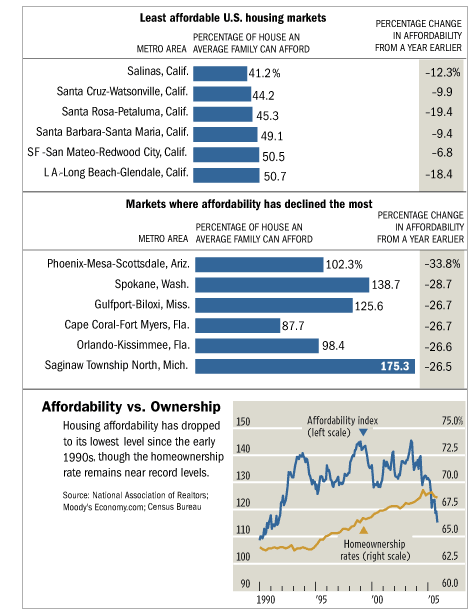

|
| weblog/wEssays archives | home | |
|
Future Affordability: The Mobile Homeless (April 5, 2006)  This may well be the future of post-bubble affordability. This is a photo of what I
call wheeled vagabonds
but others call the mobile homeless. I wrote an entry last August on the phenomenon, and
noted that it's been an alternative housing choice for many years, if not decades, for those
on tight budgets or the temporarily jobless/down on their luck.
This may well be the future of post-bubble affordability. This is a photo of what I
call wheeled vagabonds
but others call the mobile homeless. I wrote an entry last August on the phenomenon, and
noted that it's been an alternative housing choice for many years, if not decades, for those
on tight budgets or the temporarily jobless/down on their luck.
As a self-supporting (i.e. impoverished) university student back in the early 70s, I'd briefly considered modifying a rusting delivery van into a mobile, if cramped, living space. I even had a few streets deep in Manoa valley marked out as safe parking places. I'd also looked into living on a small boat in the Ala Wai Yacht Harbor as an alternative to the extraordinarily burdensome rents in Honolulu, then as now, one of the most expensive cities in the nation. (The highest has always been either Anchorage, Alaska or Honolulu, Hawaii.)  Alas, the cost of a boat slip was almost as much as the rent on my hovel/studio (literally
the cheapest rent in Honolulu at $125/month, about $560 in today's money). Since I didn't
have the savings or borrowing power to buy a large vehicle or a boat, It was actually
more practical to pay the rent, even though it was about half of my monthly part-time
paycheck.
Alas, the cost of a boat slip was almost as much as the rent on my hovel/studio (literally
the cheapest rent in Honolulu at $125/month, about $560 in today's money). Since I didn't
have the savings or borrowing power to buy a large vehicle or a boat, It was actually
more practical to pay the rent, even though it was about half of my monthly part-time
paycheck.
The lack of a bathroom, however, pretty much kills the deal--unless you have no choice. And it seems that plenty of people already have no choice. Keeping It Secret as the Family Car Becomes a Home (New York Times) Mobile Homeless Family in San Francisco (San Francisco Chronicle) Mobile Homeless Woman in San Francisco (San Francisco Chronicle) Mobile Bus Shelters in Honolulu (Honolulu Advertiser)  If you read these stories, you'll find that the mobile homeless are not
the hard-core, drug-addled homeless found on the streets of urban America, but people
who lost their homes via job loss, divorce and other forms of personal trouble.
If you read these stories, you'll find that the mobile homeless are not
the hard-core, drug-addled homeless found on the streets of urban America, but people
who lost their homes via job loss, divorce and other forms of personal trouble.
Some are employed, the so-called working poor; most of the unemployed find a job within a matter of months. So what happens to our economy when the housing bubble bursts? What always happens in a recession--job losses and tighter lending, which then lead to foreclosures and the loss of savings, homes and equity. That the bursting of the housing bubble will take down the entire economy is undeniable; please refer to A Coup de Grace to the Economy and A Monster of a Housing Bubble for the charts which outline the path of doom: as housing starts dropping in value, Americans are unable to borrow the hundreds of billions in home equity which has sustained the U.S. economy for years. (The national savings rate, by the way, is -.5%. Yes, we've spent more than we've made for many months now.) The contracting housing market causes lenders, carpenters, carpet salespeople and all the other hundreds of thousands of people whose livelihoods depended solely or largely on a booming housing market to either lose their jobs or suffer grievous losses of income. As the economy contracts, people beyond housing start to get laid off. Mortgage rates rise as the U.S. recession causes foreign investors to curtail their purchases of U.S. Treasury bonds, bumping interest rates up even as demand for housing plummets. All the calamities reinforce each other in a negative feedback loop which I (and many others) have described elsewhere (see sidebar stories under "Financial Meltdown Watch" and "Housing Bubble Watch.") This table and chart of plummeting affordability presages an enormous number of mortgage defaults and loss of equity as the housing bubble pops. The numbers indicate that vast numbers of citizens, most prominently on the West and East Coasts, have stretched their family incomes to terribly risky limits in order to buy a house, gambling, in effect, on a continued rise in appreciation. You might call this "strip-asset poker," because losing that bet will strip them of all their assets save their car and clothing. A national tragedy will soon unfold before our horrified eyes, and cities would do well to begin setting aside properly maintained areas for the mobile homeless, whose numbers are sure to increase. Sadly, these will not just be college kids, but families who bet it all on the American Dream of homeownership in a bubble economy. For more on the housing bubble and a wide array of other topics, please visit my weblog. copyright © 2006 Charles Hugh Smith. All rights reserved in all media. I would be honored if you linked this wEssay to your site, or printed a copy for your own use. |
||
|
|
weblog/wEssays | home |